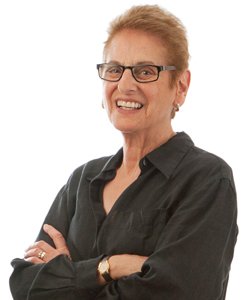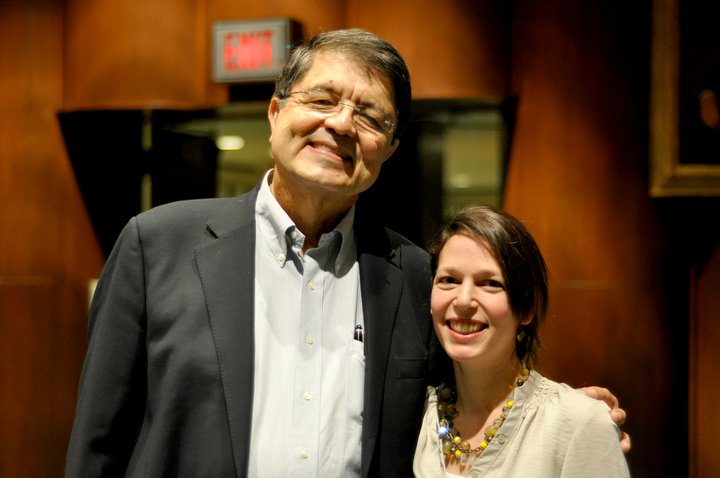Q&A: Raz Looks for Poetry of the West

Newly settled into her position as editor of the Mary Burritt Christiansen Poetry Series at the University of New Mexico Press, Hilda Raz spoke about her hopes for the series.
Jump to navigation Skip to content

Newly settled into her position as editor of the Mary Burritt Christiansen Poetry Series at the University of New Mexico Press, Hilda Raz spoke about her hopes for the series.
Washington, D.C.–based poet Reginald Dwayne Betts, author of Shahid Reads His Own Palm and the memoir A Question of Freedom, blogs about headlining at the P&W-supported reading series LouderARTS earlier this year.
The LouderARTS reading series at Bar 13 is classic. Walking towards it, you could miss it if you weren’t paying attention. The stairs leading up to the entrance had me thinking of a horror film, where the expected becomes something frightening. The door opens to dim lights, a large space filled with people, a bar wet with alcohol, and poetry banging against the walls.
It’s only fair to admit that I’ve read at Bar 13 once before. Three, maybe four, years had passed since the last time I’d read there. The crowd seemed more aware of the little things that make a poet crave the mic. Patrick Rosal, author of the forthcoming Boneshepherds, was in the audience rubbing shoulders with young poets as they all enjoyed the moment with something cold to drink.
I sat at the bar for near an hour waiting for my turn, listening to the crowd scream out lines of their favorite poems. I get a little nervous reading after six or seven poets have read and the audience has already been read to for an hour or so.
That night I read poems I’ll likely never read again. A suite of sorts, and the intimacy of the space allowed it to happen. I get all these images in my head when thinking about poetry and poetry readings. The one that nestles most comfortably is my imaginings of Bar 13. It isn’t just the alcohol. It isn’t just that Lynne Procope and Marie-Elizabeth Mali are both electric poets and excellent hosts. It isn’t the slam competition. It’s that all of those things fit perfectly into this intimate space where people come to listen.
Photo: Reginald Dwayne Betts. Credit: Rachel Eliza Griffiths.
Support for Readings/Workshops events in Washinton, D.C., is provided by an endowment established with generous contributions from the Poets & Writers Board of Directors and others. Additional support comes from the Friends of Poets & Writers.
Read Teresa Cader's "History of Hurricanes." Write a poem that is a response to it, either by using and reworking one of the lines, by crafting similar line breaks, or by adapting the poem's theme.
Now available in the App Store for the iPhone, iPod Touch, and iPad, Booktrack provides a soundtrack for e-books, including songs, ambient music, and sound effects, that is automatically paced to an individual's reading speed.
Directed by Katja Esson, Poetry of Resilience is a documentary about six international poets who individually survived Hiroshima, the Holocaust, China's Cultural Revolution, the Kurdish Genocide in Iraq, the Rwandan Genocide, and the Iranian Revolution. For more information, visit www.poetryofresilience.com.
Samuel Menashe, the first poet to receive the Neglected Masters Award from the Poetry Foundation in 2004, died Monday night in his sleep on August 22, 2011. He was eighty-five years old. In this clip, from the WNYC series “Know Your Neighbor,” Menashe is seen in his New York City apartment, where he lived for fifty years.
Washington, D.C.–based poet Reginald Dwayne Betts, author of Shahid Reads His Own Palm and the memoir A Question of Freedom, blogs about participating in a P&W-supported reading curated by the creative writing program at New York University in April 2010.
Raina J. Leon, January Gill O’Neil, and myself—I couldn't have asked for more. The three of us at NYU on a rainy Friday night. And, Cornelius Eady and Yusef Komunyakaa sat in the audience alongside emerging poet Rickey Laurentis and Catherine Barnett, a professor at NYU. The room was claustrophobic...in a good way. People squeezed in tight with nothing but poetry keeping them from going out into the rain.
I still remember Raina’s final poem about her brother. Haunting, the poem has left a lasting impression. Many of her poems do this, give me pause. And January, January read the best sex poem I’ve heard in years! A poem so filled with yearning and the unexpected that I thought the audience would soon depart to find love in the rain. The audience stayed, and allowed me to read a poem or two.
A few weeks before the reading, I Skyped with Catherine Barnett’s class. Some students from that class showed up, and one of the coolest things happened. Paul, one of Catherine's students, gave me The Prison Diary of Ho Chi Minh. He took the time to pass on the book and make some really humbling comments about my work. Folks read and write for millions of reasons, but the one that is most important to me is connecting with others.
Photo: Reginald Dwayne Betts. Credit: Rachel Eliza Griffiths.
Support for Readings/Workshops events in Washinton, D.C., is provided by an endowment established with generous contributions from the Poets & Writers Board of Directors and others. Additional support comes from the Friends of Poets & Writers.
The Academy of American Poets announced this afternoon that Anna Moschovakis has received its 2011 James Laughlin Prize. She receives the honor, which comes with a prize of five thousand dollars, for her second collection, You and Three Others Are Approaching a Lake, published by Coffee House Press.
"Moschovakis boldly writes as though Plato had never kicked poets out of the Republic," says judge Brian Teare. "In You and Three Others Are Approaching a Lake, she takes up the citizen's task of thinking through political and existential issues relevant to lives lived in increasing dependence on Internet access and globalization both."
Beneath their controlled and imperturbable surfaces, her poems perform the painful experience of the complicity with injustice that comes with citizenship—while lamenting colonization, opportunism, and capitalism, her poems search themselves for the common root of the urge toward empire, asking: 'Is it more than you would have done?'"
Teare was joined in the selection of the winning book by poets Juliana Spahr and Mónica de la Torre.
Moschovakis, who splits her time between New York City and the Catskills, is also an editor with the Ugly Duckling Presse publishing collective and a translator. Her first book is I Have Not Been Able to Get Through to Everyone (Turtle Point Press, 2006).
The Academy awards the James Laughlin Prize annually to recognize a second poetry collection.
Anna Moschovakis Reads from You and Three Others Are Approaching a Lake (Feb. 2011, Coffee House Press) from CoffeeHousePress on Vimeo.
In Peter Schjeldahl's article, "Roots: Hopper's House," which appeared in the July 11 & 18, 2011, issue of the New Yorker, he describes the history of the Edward Hopper House Art Center in Nyack, New York, mentioning that performance artist Karen Finley conducted writing classes there this summer, during which she assigned her students to "imagine and describe their personal summer interiors." Now that the season is coming to a close, imagine your summer interior and write a poem that describes it.
Since 2007, P&W has supported literary events in Houston, Texas. Literal, Latin American Voices, an award-winning bilingual magazine, was among the first Houston organizations supported by P&W. We asked its founder and director, Rose Mary Salum, author of the short story collection Spaces in Between, to share her experience as a presenter of Latin American literature and art.
What was your most successful literary program?
One of the most successful programs we hosted this year was Poetics of Displacement: Latin American Émigré Writers and the Creative Imagination. When Gisela Heffes invited us to collaborate with Rice University on this series, we immediately agreed. The response was amazing, especially to Sergio Ramírez, who I introduced! People approached me to express their absolute satisfaction.
 What makes your programs unique?
What makes your programs unique?
We invite established authors from Latin America, who are perhaps not as well-known in the United States. Everyone is familiar with the boom authors—the García Marquezs and Vargas Llosas. Besides these magnificent authors, there is a vast array of writers who are innovative and at the vanguard of literature. We have always questioned the practice of promoting writers familiar to our audiences to minimize the risk of failure. Ultimately, the quality of work is what must win in the end. Having a magazine with these characteristics (bilingual with Latin American subject matter, but still international) puts us in the peculiar place of voicing a de-centered point of view that steers away from the dominant culture, and we want to keep going this way. The United States is becoming more and more aware of the vast repository of literature that exists “down there.”
How do you find and invite readers?
I carefully choose dates and venues to make it easy for people to visit. There’s a huge niche for Latin American writers and readers in the United States, but we are scattered. Houston is a gateway at the perfect geographical point of connection between a continent with two languages. The mission of Literal is to exploit this location and get these cultures closer to each other.
Has literary presenting informed your writing life?
Every time I research new authors and read their books, their work has such an impact on me that some of my guests become characters in my fiction.
What is the value of literary programs in your community?
We cannot ignore the globalized world where influences roam freely. A program about literature is all about exchanging ideas, perspectives, and culture. Having said that, the programs we organize are always centered on the idea of being a platform for dialog, even if we are not familiar with other cultures within our own borders. “There is a tendency to abstract and aestheticize the colossal displacement of peoples and their cultures generated by globalization,” explains Lorraina Pinnell. A publication like Literal has a special role in addressing, in concrete terms and forms, cross-cultural contacts whirling through Canada, the United States, and Latin America. For our part, we are dedicated to resisting this tendency to abstract an entire reality; the publication and, moreover, the events we organize present distinct regions of the Americas in their various and sometimes clashing embodiments.
Photo: P&W-supported writer Sergio Ramírez with Gisela Heffes of Rice University. Credit: Enrique Vazquez.
Support for Readings/Workshops events in Houston is provided by an endowment established with generous contributions from the Poets & Writers Board of Directors and others. Additional support comes from the Friends of Poets & Writers.